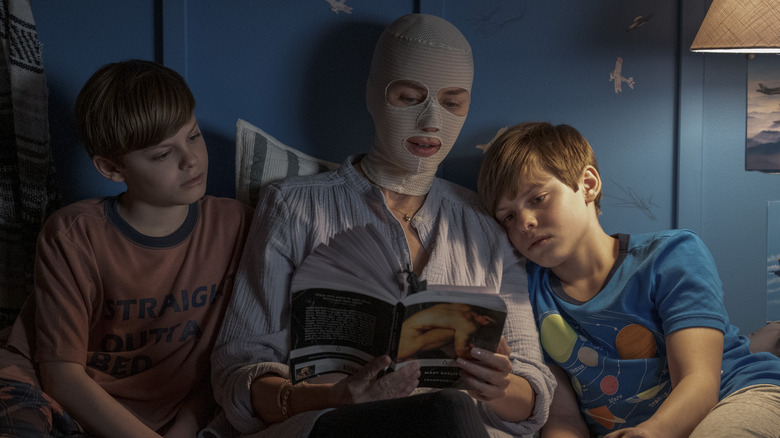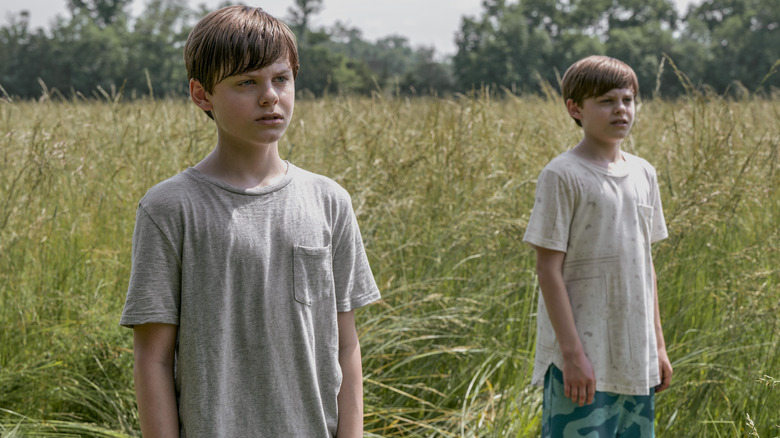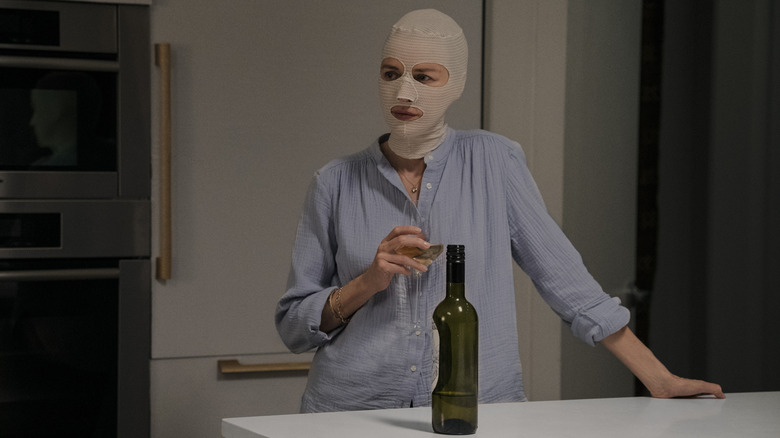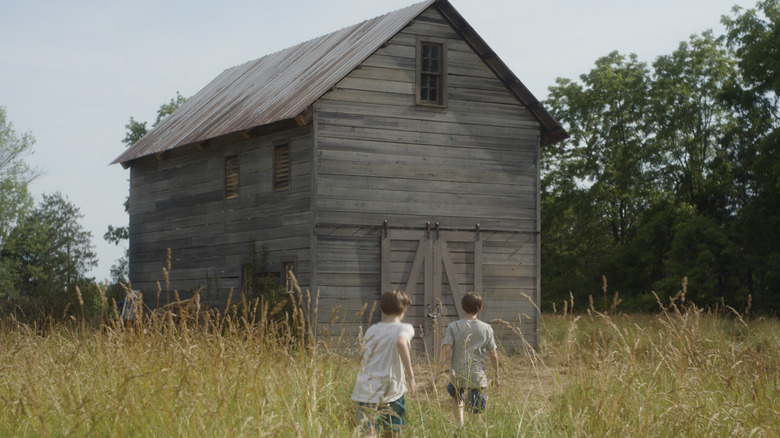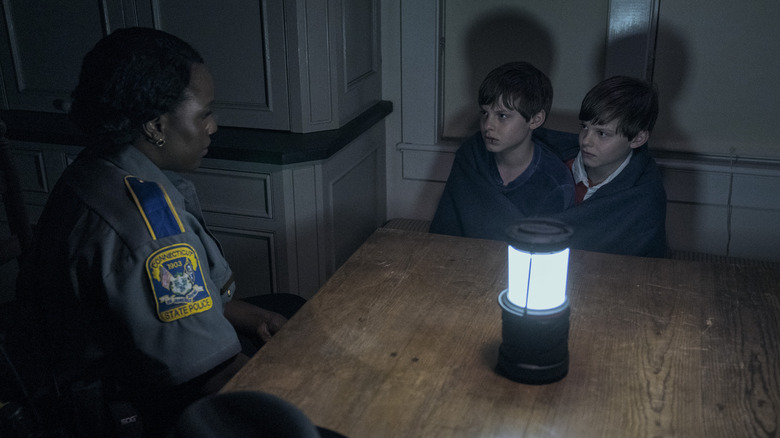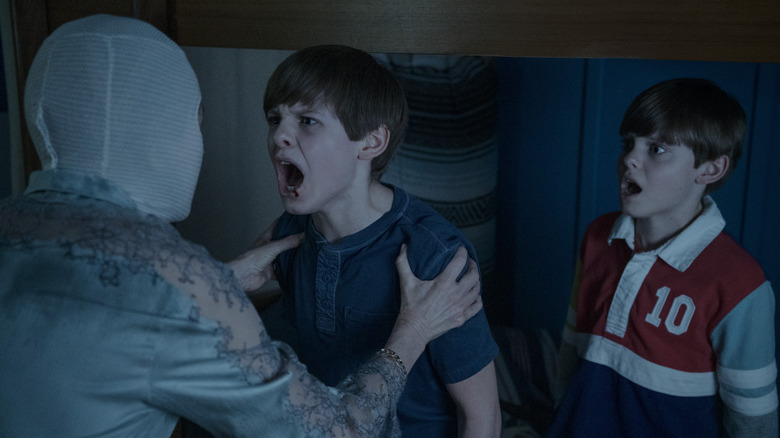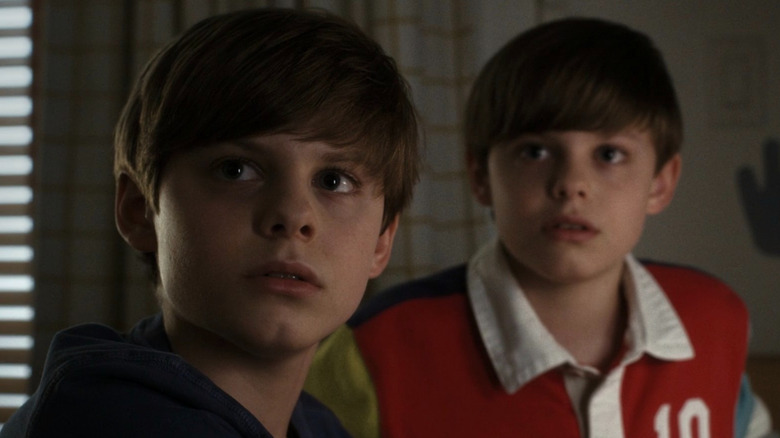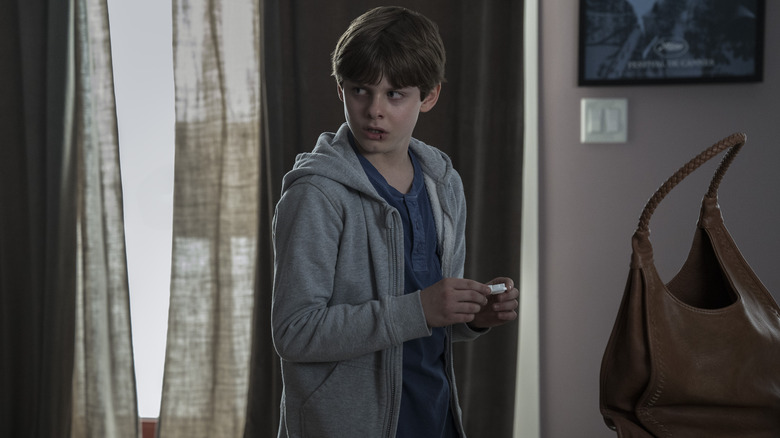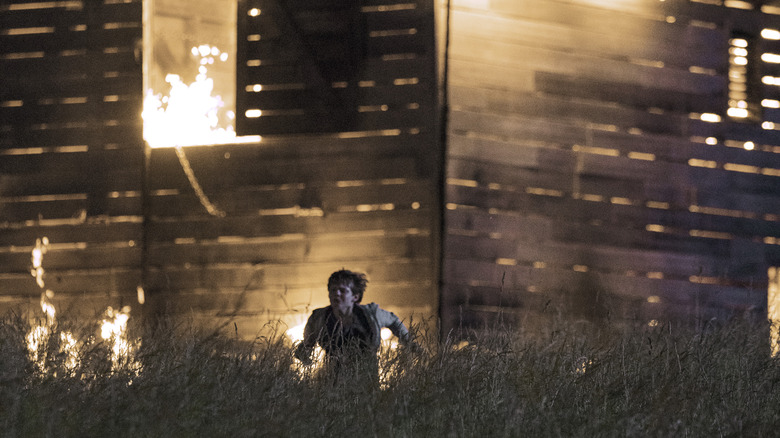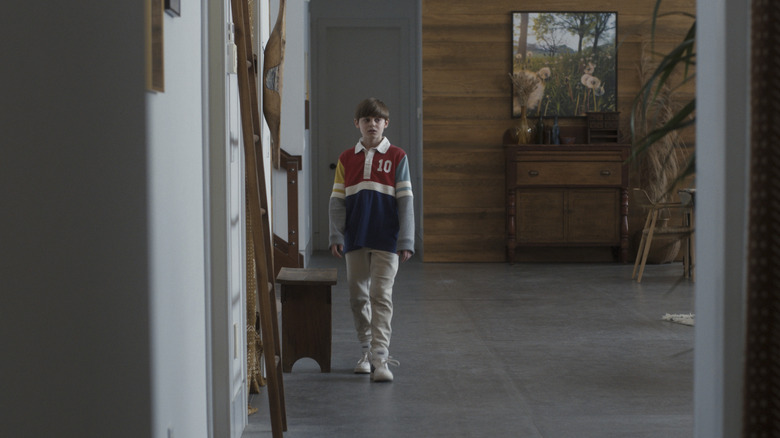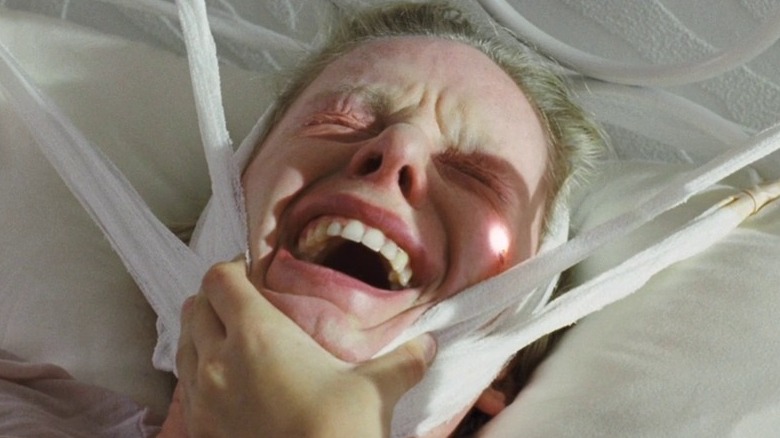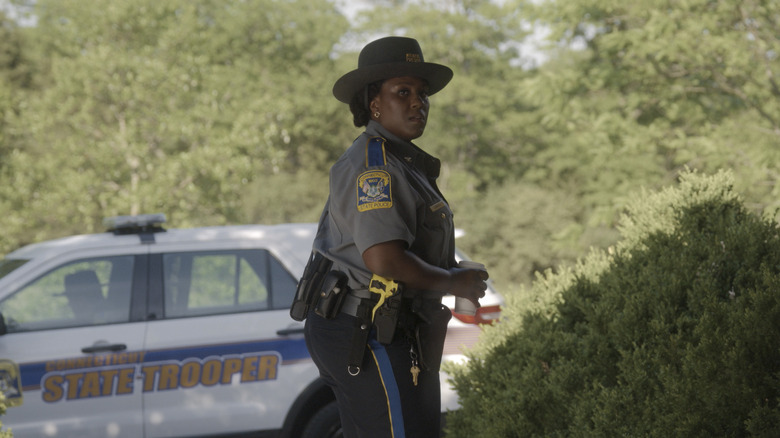The Ending Of Goodnight Mommy Explained
"Goodnight Mommy" is the 2022 English-language remake of the 2014 Austrian horror film of the same name directed by Severin Fiala and Veronika Franz. The remake takes a slightly different approach to the original's film distressing subject matter. It focuses more on a kind of twisted closure rather than the physical and mental strain that we can put ourselves and others through in order to make reality fit our own preferred perspective. This version of "Goodnight Mommy" doesn't have the same level of excruciating violence as the original, but instead maintains an oddly optimistic and deceptively upbeat tone to deliver its emotional yet sinister message.
Twin brothers Elias and Lukas (Cameron and Nicholas Crovetti) go to stay with their mother (Naomi Watts) following the fall out of her divorce from their father. Upon arriving at their country home, the boys are startled to find their mother has undergone surgery and is wearing a bandage that covers her entire face. They soon notice that their mother isn't acting like herself and begin to suspect that they are living with an imposter.
"Goodnight Mommy" raises questions about grief, mental health, and identity, all of which come to a head in its finale. So, here is the ending of "Goodnight Mommy" explained through the context of the film's underlying themes and story.
Warning: major spoilers ahead.
One happy family
The breaking of a family can be a difficult thing for anyone — especially a child — and "Goodnight Mommy" begins by showing Elias and Lukas as part of a happy, healthy family. Taking place shortly before the rest of the movie unfolds, the first scene is cell phone footage of Mother (also known as "Mommy") singing a pluralized rendition of "You Are My Sunshine" to her twin boys in bed. Things seem to be as wonderful as can be — until we cut to the story proper and learn that something bad has happened off camera, so this happy family isn't together anymore.
In the scene following this cell phone footage, we see Elias drawing a picture of his family while in the car, en route to see his mother. This moment is as important as the opening of the film, since it lets us know right off the bat that all Elias wants is for him and his brother Lukas to be happily reunited with Mother again. He spends the rest of the film in pursuit of this goal, although not in the way we initially suspect.
At first, it appears that the only way the boys can be happy again is to get to the bottom of the mystery surrounding this person masquerading as their mother. However, once we reach the final act, the truth comes out and we understand that Elias can't be truly happy until he's able to embrace his delusions.
Mommy just needed a tune up
When the boys are greeted by their mother, they're immediately suspicious of her. Perhaps they expect that she will be waiting for them at the door with open arms, ready to give them both a giant hug. Instead, they arrive at a quiet house, where leftover food collects flies and a woman in a mask emerges from the shadows of Mother's bedroom. She explains that the mask is helping her heal from a medical procedure.
The boys don't understand why she would get surgery if she isn't sick, so she tells them that like an old car, she just needed a tune-up. It's revealed shortly after that Mother is an actress of some renown. Therefore, it makes sense that she would get some plastic surgery — especially if, as the dialogue insinuates, her career isn't in the best place right now.
Although that explains the bandages, it does nothing to excuse her short temper or her refusal to sing them to sleep the way we see her do at the beginning of the film. From the jump, the movie has us questioning the reality of things and using sleight of hand to distract us with one mystery, while a completely different one is being subtly unveiled.
Nightmares of the barn
For many horror films, (creepy) dream sequences can play an important role in getting closer to the truth. Since Mother is recovering and there's not much else to do, Elias and Lukas decide to explore the grounds around their home. They go outside and see an old barn standing alone in the field behind the house. The moment Elias sees it, his demeanor changes. We don't know why, but it's clearly very important to him. Mother tells him they're not allowed in the barn, but they head in there anyway.
Elias doesn't like what he finds. Other than a pile of toys and comics, something that looks like dark smears of blood can be seen on the wall. When Mother discovers he's been in the barn, she forbids him from going outside, which leads to Elias dreaming about the barn. As the camera pushes in over the tall grass, the light of a fire reveals a hunched human form.
It turns out that these are more than dreams: They're memories. Some time ago, Elias and Lukas were playing in the barn and Elias had a gun that he didn't know was loaded, which accidentally went off and ended Lukas' life. The Lukas we've been seeing isn't real but rather, he is a manifestation of Elias' inability to accept what he did. When he's awake, Elias can ignore the truth. But when he sleeps, the truth comes looking for him.
Why didn't the police help?
If the police officers who show up in a horror film were good at their job, the movie would be over in 20 minutes. Therefore, it's important to make sure that they're either bumbling idiots, get killed off, or are secretly evil themselves. Although, that's not really the case with either Sandy (Crystal Lucas-Perry) or Gary (Jeremy Bobb), the two officers who find Elias hiding out in a neighbor's house.
Since their scene comes in the middle of the movie, it isn't surprising that they don't wind up saving the day. What's shocking though is that they mislead the boys into thinking they're helping them, only to take them back home. At this point of the film, we don't know Lukas is dead and that Mother truly is their mother. So, it seems strange that the police would take these boys back to a woman they're so blatantly scared of.
However, once the ending reveals the truth, these scenes make sense. These cops probably know about Lukas' death and understand that things must be difficult at home. When they have a chat with Mother (most of which we don't see), she probably explained that Elias isn't coping well with Lukas' death and has been pretending that he's is still alive. So, although their actions may make us want to pull our hair out, they truly thought they were doing what was best for Elias.
Tired of pretending
"Goodnight Mommy" is filled with misdirections, whose meanings become clearer at the end of the film when the truth of Lukas' death is revealed. One such moment is when Elias overhears Mother talking to an unknown person on the telephone. She tells this person that "he knows something is wrong" and that she is tired of pretending. The first watch of this scene only further legitimizes the idea that she is an imposter: Elias knows that something is wrong because she's pretending to be his mother and she's tired of it.
Once Elias is forced to confront the fact that he accidentally killed his brother, our understanding of that conversation shifts. The subject is still Elias, but the "something wrong" he senses isn't that she's a stranger; it's that Mother is struggling to keep up this charade. She's tired of pretending because she needs to move on from this — she needs to try and reassemble a normal life.
That could be another reason she got the surgery: to get back to work and do her best to make peace with the loss of one of her sons. Elias, though, is nowhere near ready to stop pretending. In fact, based on the way he lashes out when Mother shows him the truth, pretending may be the only thing keeping him alive.
We'll never be alone
As Elias and Lukas become more convinced that Mother isn't who she says she is, they decide to flee from the house in the middle of the night. It's pouring rain and they come across an empty house. With no other option for shelter, the brothers break in and build a blanket fort the rest under for the night. The utter silence is too much for Elias to bear, so he asks his brother to tell him a story. Lukas does so, but with a strange twist that makes us question his character for the first time.
He tells Elias that when they were first conceived, they were a single entity. Then, because they were smart, they split into two, so they would never have to be alone. It sounds like Lukas is way too attached to his sibling and may be manipulating him because he thinks their mother is trying to keep them apart. He even says as much later in the film, when he gets caught in a lie.
In hindsight, though, we understand this is Elias' own delusion. He is comforting himself, assuring himself that his brother isn't dead because they're twins and twins can never be alone. It is also a subconscious tactic to frame his mother as the enemy because she is trying to make him accept what happened. If she thinks life would be better in a world without Lukas then she must be a villain.
Torn apart
Before getting into the final story beats of the film, it's important to streamline a few things that we've already discussed to clarify the context. The first important detail to remember is that this was once a wonderfully happy family. Then, tragedy struck in the form of a horrible accident: Elias mistakenly shot his brother Lukas in the barn behind their house and killed him.
The incident causes a rift in the family. Elias can't accept what he did, so his mind reverts to a time before the accident when Lukas was still alive. We don't know if the divorce causes Elias to drown in denial, or if his choice to imagine Lukas never died is what leads to the divorce. Either way, it's safe to say that having one parent willing to let their kid act out their grief in their own time and one who wants no part of this fantasy likely puts a strain on the relationship.
Elias is so set on keeping Lukas alive in his mind that when his mother starts acting cold, distant, and abusive towards him, he imagines that she is a stranger, who has replaced his formerly loving, gentle mother. His inability to admit that his brother is gone makes him view his mother as an enemy that has to be stopped. This is why Lukas is seen as the manipulative sibling: He represents the world as Elias wants it to be, while Mother represents reality.
Let the truth burn
In the last act of the film, Elias gets fed up with this woman pretending to be his mother, so he decides to get the truth out of her by any means. He ties her to the bed and demands to know what she did with their mother. When she refuses to admit her ruse, he douses her with ice water. Part of the reason he thinks she's an imposter is that her eyes are blue, while photos of his mother show her with green eyes. She explains that she wears contacts for work and even tells him that he can find them in her purse.
Lukas claims they aren't in her bag, but when Elias looks, he finds them, and he's suddenly frightened of his brother. Looking for answers, he cuts his mother loose and she takes him to the barn. This is when she explains what happened. Suddenly, Elias' dreams make sense to him: The figure in the barn is his mother, hunched over the lifeless body of his brother Lukas.
Mother tries to tell him it wasn't his fault and it will be okay, but he can't hear it. He lashes out, knocking her off the loft. She dies when she hits the ground and the lantern she carried with her breaks. The flames quickly grab hold of the straw, filling the barn. Before we know it, Elias is running away from an inferno as the barn — and the evidence within — burns. He has finally killed the truth he's been so desperate to be rid of.
Protecting yourself
As the barn burns, Elias is greeted by his mother and Lukas: They're both unharmed and stand in the field. Mother tells him he did nothing wrong and he hugs her, grateful to see that she's alive. This is the perfect version of his mother, the one he expected to find several days ago when he and Lukas first showed up: the one who used to sing him to sleep. It's further evidence that Elias is not ready for the truth.
At least he's reunited with Elias and his mother, just as he wanted at the start of the film. What's so troubling about this is that it feels human. This isn't some supernatural world where ghosts can come and go; it's a case of human beings distorting their understanding of reality to make the world a more comforting place to live. Elias is just a boy, who has been asked to confront actions that resulted in the deaths of two people he loves very much.
There is an optimism to this ending that is troubling. Elias' self-deception has been so effective that even as he watches the barn burn, he can still imagine that his mother was never harmed. He has gotten so good at protecting himself from heartbreak, that even now he is able to live a lie because it's safer than the truth. On the one hand, Elias will be fine because he can never be separated from his mother and Lukas. On the other hand, it is likely that he will never be okay again.
A less torturous ending
"Goodnight Mommy" adheres rather closely to the 2014 original in a lot of respects. Structurally, it is nearly identical, while the story's twist is the same, and the cinematography is occasionally very similar. The major difference is tone. While the remake has plenty of disturbing moments of its own, the original film is much colder, harsher, and meaner.
Look no further than the ending of the original. Elias and Lukas don't use borderline torture tactics to get information from their mother: They flat-out brutalize her. We won't go into specifics here, but they abuse their mother in horrific, agonizing ways that are truly difficult to watch. Not only that, but Elias intentionally sets his mother on fire and watches her scream in pain, as the flames take her life.
The final image of the Austrian film is of Elias, Mother, and Lukas standing together in a field, looking directly into camera, as if they're waiting for someone to take a picture. It is a sinister moment that mocks the concept of a happy family and dares the audience to make peace with what they've just witnessed. The intention here seems to be to expose the cruelty of self-deception, while the remake is more ambivalent about the subject.
The power of ambiguity
When taken literally, everything we've written here encapsulates the ending of "Goodnight Mommy." However, filmmaking is an art form, and art is always open to interpretation. Although all the evidence we've mentioned supports the narrative that Elias has been intentionally lying to himself to survive, the movie never definitively states that this is the case.
Sure, that's probably what's going on, but it doesn't mean it is 100% accurate. What if this was all an elaborate scheme orchestrated by Mother to manipulate her children into staying loyal to her instead of their father? After all, there is a scene at the start of the film where the father mentions that Mother won't want to see him. When Mother discovers her children have been contacting their father, she absolutely loses it and destroys their phone. Maybe she really does want them all to herself.
That's the wonderful thing about an ambiguous ending: Each viewer can take something away from a film based on their own personal worldview and experiences. This is just one reading of the film. However, it's important to remember the dance the movie does with reality and fiction. At the end of the day, it's up to the viewer to decide what they believe to be truth.
